
There's a five-year waiting list to get in here.
to your restaurant, located in your own home -built by him and his family- and baptized by The New Yorker himself as "the most exclusive in the world" , they will sit down to eat this 2017 inhabitants of 80 countries who made their reservation in 2012. A gastronomic experience of more than five hours , in which the table will parade twenty dishes that are different every night . "Some are just a bite, others have loads of flavors and components. I also make dozens of my own cheese and meats cured in pine needles, which are also part of the menu," explains Baehrel.
The evening has been personalized down to the smallest detail by this Leonardo da Vinci of the kitchen, that he even creates the vessels in which dinner is served with gadgets found on your property . It's evident that Baehrel takes his work seriously. love and dedication , and in fact, during our conversation he does not miss an opportunity to comment that he considers a privilege Interact with each of the guests. "Thanks to my guests from all over the world, who keep coming here, I can live my life this way. For that reason I am the luckiest person in the world! ' exclaims the cook.
that life you love It has a lot of research and everything of curiosity for nature, a concern that has accompanied him since his childhood: "The concept of the native harvest, that is, of living from what the land around me gives, goes back to my childhood. genuine fascination and interest in plants , trees and endemic mushrooms that grew in the forest, and many times I took them home! My mother, who was an avid gardener, often researched its origin. Thus, when I reached adolescence, I already had a solid base of knowledge in relation to Native species …Although back then I had no idea what she was going to do with him!”
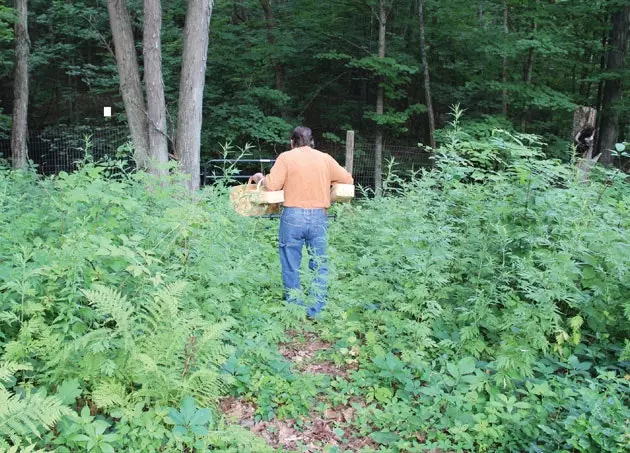
Controlling the process from the first seed
The notion of how to translate this vast knowledge came, in the form of Epiphany , 30 years ago. "Even before I opened the restaurant at home, in 1989, I realized that all I needed to create a unique dining experience it was already here, on my 12-acre property. If I was lucky, I could spend my life exploring, developing, creating and sharing my discoveries with my guests. One thing is for sure, though: it's not the sort of thing that happens in tiny Earlton!" he says, referring to the sleepy county in which his avant-garde restaurant.
All that self-taught wisdom has been lovingly collected in a book by Baehrel himself, that he has written the texts and taken the photos of **Native Harvest: The Inspirational Cuisine of Damon Baehrel**. The volume describes the author's philosophy, ingredients, preparations and experiences with respect to a way of planting, harvesting and cooking that pays attention to ingredients that, from the outset, we do not classify as "groceries". In this way, the chef defies, with his findings, many of the traditional precepts around food and its preparation.
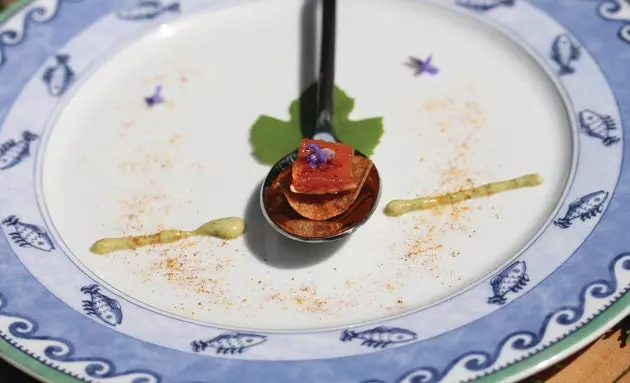
The menu is made up of dishes and almost "snacks"
Thus, for example, Baehrel explains to us that one of the most extraordinary discoveries he has made has been that of learn how to preserve and cure vegetables, meats and seafood without salt, just using the power of pine needles. He also finds "the potential and variation" of the more than half a dozen saps he harvests every year, which has turned out to be "hugely inspiring" because of its possibilities. "Imagine the world of opportunity that opens up to a cook when he discovers that Sycamore sap, when concentrated, becomes slightly salty, smoky, and sweet! For its part, that of the cherry tree tastes somewhat bitter, salty, sweet and with herbal notes!, and that of the pecan turns into a dark nectar, rich in nuances and salty, a perfect liquid for simmer ", explains enthusiastically the chef.
" I've made thousands of discoveries , and I still find myself doing many others. Since I don't have suppliers and I create each component, including flours -pine, dandelion, clover, nuts and acorns, among others- and hand pressed oils, the property, a true indigenous farm, has and has had many secrets that are discovered by simply letting nature reveal itself Baehrel comments about his research.
Once brought to the table, these finds seem to ravish diners, who can't help but repeat that the chef offers them ** "the best dinner of their lives" ** , even considering that it costs around $400 per head ... and that you have to wait until five years to try it.
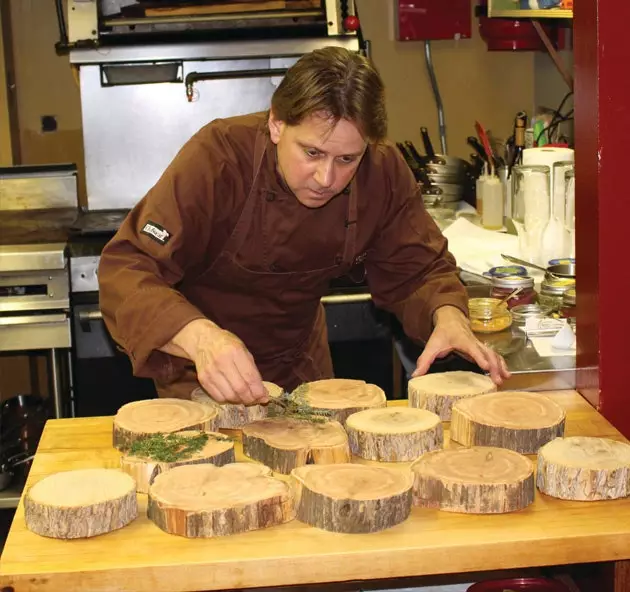
A plating also very rustic
THE CONTROVERSY
means like CNN, Bloomberg TV, Fox News, ABC News, NBC, Reuters or CCTV-America (with a very wide audience in the United States) have documented Baehrel's activity, giving rise, according to him, to such a large number of reservations that in March 2014 they had to stop admitting new petitions. However, it has been an article in ** The New Yorker **, published in August 2016, that has sparked controversy, calling into question everything that surrounds the chef: from the number of diners that he gets down to the techniques that he uses to make his dishes.
Thus, Nick Paumgarten recounted in the extensive piece that there was no possible way that Baehrel would receive as many clients as he claimed (although no number is mentioned in the article), to which the chef clarifies that he usually serve dinners for ten people during the days that it opens -and it does not open every day-, which explains why the waiting list is so long. With regard to techniques, the journalist - who goes to the restaurant to try a tasting menu and is delighted - questions its validity based on testimonies from, for example, cheese producers.
"Three dozen cheeses! The cheese experts I spoke with consider it highly unlikely , especially considering the fact that Baehrel states that he makes the cheese without the rennet enzyme standard; he said he used organic coagulants such as nettles or carrot leaf straw. Even for a full-time cheesemaker, three dozen would be a lot especially if they are not mere variations of one or two cheeses", wrote Paumgarten -who, according to him, had the opportunity to visit the cupboard in which the chef prepares them.

The sap, very present in the kitchen of Baehrel
"Instead of exploring the foundations of the cheeses (or preserved milk, as I call it) that I have been creating for over 20 years, Paumgarten went to anonymous conventional "experts" who have no idea what I do or how I do it . Why hasn't he talked to any of the real cheese experts who have been to my dinners and not only embrace my methods, but are trying to incorporate some of my techniques and discoveries into their products? There is even seven or eight recipes from how I make cheese in my book ! I produce very small (sometimes tiny) quantities of over three dozen mild, semi-cured and cured," Baehrel explains in reply.
The chef, who is deeply hurt by the text of The New Yorker for, as he claims, not having used the sources he provided them with to support his data - and instead attempting to discredit him - he believes this to be " a case of "experts" who don't understand the scope and rationale of what I do and the small quantities I produce". However, it seems that what the editor fails to understand is more than just his processes -which give him pause when, for example, he enjoys a long menu and, when he finishes and goes to the kitchen, everything is immaculate -: he also doubts the identity of who have gone there for dinner.
"There were also other suspicious matters: an alleged visit from comedian Aziz Ansari (which he denied)," writes Paumgarten. He also cites other item (which does not link) in which it is said that the band Journey and Noma chef René Redzepi , went to dinner there, which Baehrel himself denies when he is asked by the journalist, alleging that he said that "would like" that Journey, His favorite group ate there. As for the chef of the acclaimed Noma , Baehrel explains that it was not Redzepi who came, but Madds Resflund (who even posted a photo of the visit on his Instagram account).
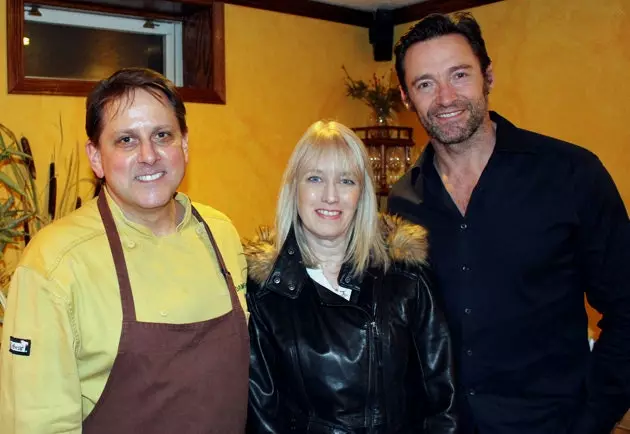
Hugh Jackman has also enjoyed Baehrel's cooking
On the other hand, Earlton's chef also tells us that he has never told anyone that Aziz Ansari ate there -in fact, he claims not to know the actor-, but that, searching his records, he sees that Ansari's representative requested a table at such short notice They couldn't put it on the list. Likewise, the editor of The New Yorker also supports his thesis of "impossibilities" claiming to have spoken with an anonymous diner that, once he had left the farm, he jumped over the fence to go back in for his coat and saw that there was no other service in the restaurant , just as the cook had said during dinner.
Baehrel once again debunks what he considers a misunderstanding, even giving us the diner's name: **Sean Nutley, manager of Blue Cashew**. What happened, according to the chef, is that, during that dinner, one of your loved ones passed away and he had to cancel the next shift, which is why the farm was closed and empty.
There are many suspicions raised by Paumgarten, but Baehrel seems to have a plausible explanation for all of them. So why would the journalist do such a thing? Baehrel has a theory: "It's the simple case of someone who sees himself as a major big-city writer , who lives in a bubble. When something special or positive happens outside of that bubble, they just assume it can't be possible." And he continues, "For some reason, even even though he has a REAL license and an inspected restaurant, immaculate and celebrated, known to the world for nearly three decades, the fact that be doing something different in earlton and has taken a different path from that of the so-called "experts" offends them somehow, and for that reason, my restaurant is not "real" in their eyes", explains the cook.
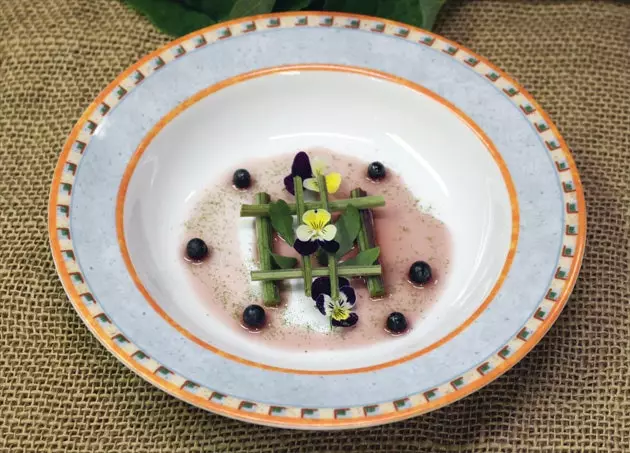
a unique kitchen
Baehrel also alleges that the article has been responded to with Positive comments of those who have ever eaten in his restaurant. In fact, that detail can be seen even on ** Yelp, ** a social network of establishments in which he continually praises it, despite the fact that the profile of the place appears over and over again as "closed" -a fact caused, according to Baehrel, by people with the same intentions as Paumgarten-.
Be that as it may, the chef sticks to his idea that his cooking is misunderstood by the most elite circles , who, in his opinion, have fun trying to belittle him, although he does not lose his enthusiasm: " The foodies of the world have embraced and celebrated what I do during decades. The media is the LAST to find out what I do, and it's usually the other way around", he points out, ending by repeating:" I consider myself the luckiest person in the world to live this way ".
